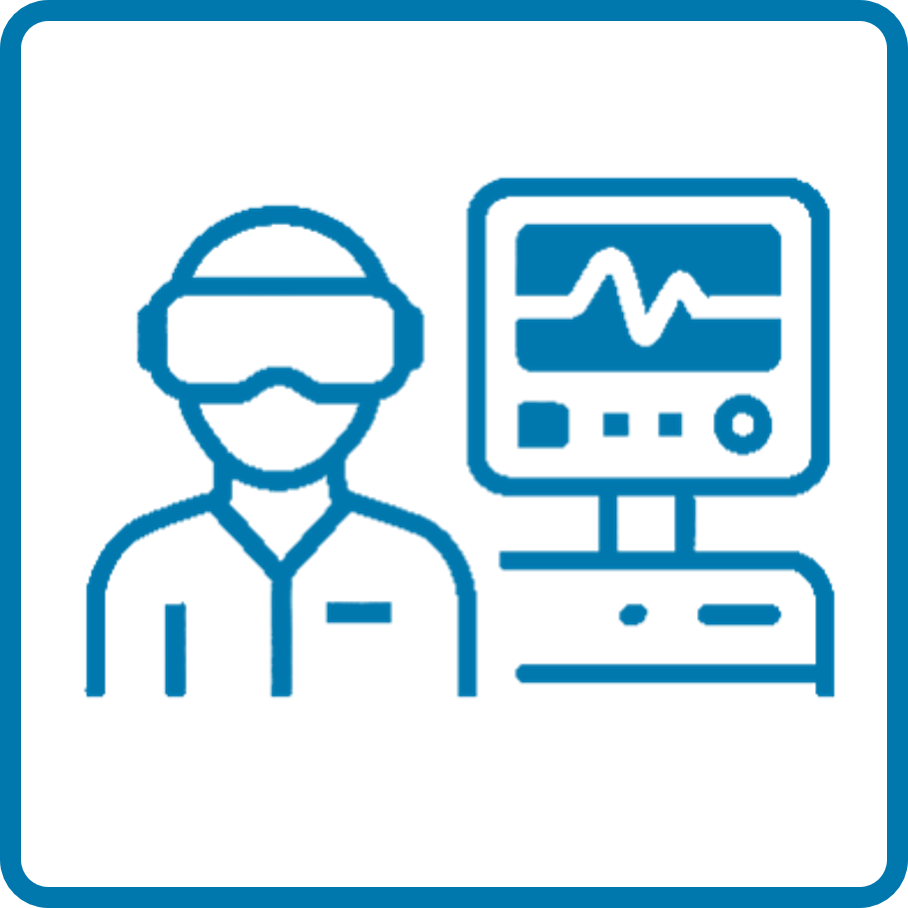Platform Elements
Modular XR Simulation Engine
MediXR is built on a modular simulation architecture that allows clinical scenarios to be deployed as independent training units. Each module can be customized for different skill levels, or environments, enabling flexible sequencing from emergency triage to advanced surgical prep across various curricula needs.
OR & Surgical Team Simulation
Simulations recreate operating room environments where surgical techs and support staff practice sterile protocol, equipment prep, and interprofessional communication. Integrated AI avatars simulate surgeon interaction, patient handoff, and procedural timing—supporting OR readiness across roles.
Soft Skills & Empathy Training
MediXR integrates narrative-driven modules that focus on emotional intelligence, active listening, and de-escalation during high-stress encounters. From delivering bad news to navigating team conflict, users develop key interpersonal skills that complement technical mastery.
XR for Nursing Education
Designed to bridge the gap between textbook theory and bedside reality, XR nursing modules immerse trainees in high-pressure care environments such as ER, ICU, and recovery rooms. Users perform assessments, interact with patients, administer protocols, and develop clinical judgment in safe, repeatable XR settings.
XR for Biomedical Device Training
MediXR includes interactive digital twins of medical devices, such as monitors, ventilators, and pumps, built with functioning UI elements. These tools train users on startup sequences, calibration, usage protocols, and emergency handling—ideal for both biomedical engineers and bedside clinical staff candidates.
■ Deployment
Platforms
MediXR runs on a wide spectrum of hardware—from PC-connected VR with ultra-fidelity rendering to mobile-optimized standalone headsets (Meta Quest, Pico). Augmented Reality deployments can be available for Apple Vision Pro and other emerging enterprise AR systems in line with a wide range of institutional and enterprise needs, allowing device overlays and real-world integration. The platform’s architecture is designed for adaptive performance, ensuring consistent quality across devices by intelligently scaling graphics fidelity and dynamic object complexity based on the capabilities of the target hardware. This allows each deployment—from mobile headsets to high-end systems—to deliver an optimal user experience without sacrificing realism or functionality.Technology
MediXR leverages industry-leading XR technologies to deliver clinical-grade simulation environments that are both immersive and scalable. From photorealistic rendering to seamless real-time interaction, our platform integrates the latest in spatial computing, cloud compatibility, and multi-device optimization—ensuring educators, healthcare providers, & enterprise partners can deploy powerful training modules anywhere in the world.
Tech Stack
Unreal Engine 5 for high-fidelity 3D rendering and real-time simulation
Nanite for efficient scene complexity and real-time lighting realism in Flat Screen, (PC-Powered) VR & AR
Cutting-edge parametric and polygon 3D & 2D vector, vertex and raster design and texturizing software, as well as custom in-house tools for asset development
Optimized GPU support for Intel Arc, NVIDIA RTX, and Apple M-series chips
Cloud-based content distribution architecture for seamless remote deployment
MediXR’s backend supports continuous updates, modular builds, and real-time environment layering for dynamic content integration.
Device Compatibilty
MediXR runs across a diverse ecosystem of hardware to ensure flexibility:
Standalone Android headsets: Meta Quest 3, Pico 4 (with mobile-optimized rendering)
PC-tethered VR: High-fidelity rendering for complex multi-user scenes
AR platforms: Apple Vision Pro (active development), (thru Android SDK, when available soon) Samsung Moohan (ongoing R&D stage)
All modules are built to auto-detect hardware capacity and adjust asset density and interaction fidelity accordingly.
Data & Optimization
Dynamic asset streaming to load only relevant textures and geometry
Level-of-detail (LOD) hierarchies for devices and characters
Object pooling & culling in high-object-count scenarios (ICU, OR, mass casualty)
Heatmap-based scene profiling to identify GPU/CPU stress points
We also support learning analytics export (SCORM/xAPI-ready) to help institutions track user progression, interaction frequency, and decision outcomes.
AI NPC Behavior / Interaction Design
Our AI-driven non-player characters (NPCs) simulate realistic clinical interactions:
Patients with voice-reactive avatars, facial animation, and contextual emotion states
Clinical staff avatars for interdisciplinary teamwork scenarios
Dynamic response trees that adapt to user tone, delay, or protocol deviation
NPC behavior is underpinned by behavioral scripting and machine-learned response triggers, offering authentic feedback loops for both hard and soft skills.
Privacy & Security
MediXR follows strict data protection protocols:
HIPAA-informed virtual environments for U.S. clinical partners
No user-identifiable data storage
No user-identifiable data transmission
Encrypted usage logs
Anonymized analytics
Device-specific access control
institutional firewall compliance options
Following Alpha & Beta period:
MediXR is committed to delivering a secure, policy-aligned training environment for every user—from high school learners in Dhaka to surgical trainees in California. Full compliance frameworks and data protections will be rolled out in alignment with our post-beta deployment milestones.
Contact us
Any inquiries about the platform?
Fill out some info and we will be in touch shortly.
















